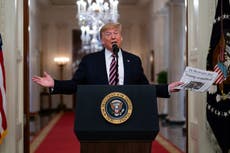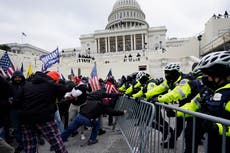Who are the members of the January 6 select committee?
The panel set up to investigate the causes and facts of the Capitol riot has held a series of blockbuster hearings
The select committee impanelled to investigate the 6 January 2021 attack on the US Capitol began its ninth public hearing on Thursday, the final hearing set to take place before the November midterm elections.
The hearings have elevated the panel’s members to a higher level of public notoriety throughout the summer and into the fall. Here’s a rundown of who they are.
Bennie Thompson (Democrat, Mississippi)
Bennie Thompson juggles his duties as head of the 6 January panel with his chairmanship of the House Homeland Security Committee. He is also known for his long record of campaigning to protect and improve voting rights.
In a recent interview as the committee’s first summer hearing approached, Mr Thompson emphasised that as far as he is concerned, the stakes could scarcely be higher.
“People I know fought and died in this country for me to have the right to represent them and for them to have the right to vote,” he said to CNN. “I’m not going to let any insurrectionist, rioter, crazy person come here and take this pin.”
Mr Thompson’s campaign office in Jackson, Mississippi was recently the target of a “terroristic” threat, with police arresting a suspect who allegedly walked in an told staffers that if he could not see Mr Thompson the result would be “one of the biggest bloodsheds in Jackson”.
Liz Cheney (Republican, Wyoming)
Arguably the most publicly visible member of the committee, Liz Cheney was the third-ranking House Republican when the Capitol riot occurred. Afterward, she became a furious public critic of the then-president, voting for his impeachment along with just nine of her colleagues – in the process making herself persona non grata in the almost fully Trumpified Republican Party.
She has since embraced this status with gusto, and has kept up her uncompromising statements on the insurrection and its causes.
Ms Cheney, who has a long conservative record, was handily defeated in a primary for her Wyoming seat by Trump-backed Harriet Hageman and will leave Congress in January. She has said that she is considering a campaign for the presidency in 2024 as an alternative to Mr Trump and other candidates aligned with his movement, though she appears to have precious little support among Republican voters.
Adam Kinzinger (Republican, Illinois)
Retiring at the end of this term, Adam Kinzinger is Ms Cheney’s only GOP colleague on the committee. Like her, he voted to impeach Donald Trump after the insurrection – and like her, he is a furious detractor not just of the former president, but of his party and its fealty to the disgraced commander-in-chief.
Where Mr Kinzinger differs from Ms Cheney, however, is that he clearly relishes taking the fight to other Republicans and their supporters. He is one of the most exuberant elected Trump critics on Twitter and a regular talking head guest outside the right-wing media ecosystem. But despite his looming retirement, his activities are not limited to caustic commentary: via his Country First fundraising operation, he is helping fund and organise for candidates who supported Mr Trump’s impeachment.
Jamie Raskin (Democrat, Maryland)
The lead impeachment manager at Mr Trump’s post-6 january trial, Jamie Raskin was tasked with making the case to the Senate that the seriousness of the Capitol attack warranted conviction. He came close to tears while describing the weight of evidence and the dangers posed not just by the event itself but the precedent it set for presidential conduct.

But while his performance during the impeachment proceedings saw him focus on conveying gravitas, Mr Raskin has a pugnacious side, frequently sparring with hardcore right-wing Republican colleagues in Congress and delivering excoriating remarks at select committee votes. He is also reported to be one of the more ambitious committee members when it comes to proposing what can be done to prevent another 6 January, and is on record opposing the continued existence of the Electoral College.
Zoe Lofgren (Democrat, California)
Along with Mr Raskin, Zoe Lofgren was closely involved in the post-6 January impeachment of Donald Trump, at one point addressing the Senate trial on behalf of the House managers in favour of an amendment that would require the White House more evidence about the events leading up to the riot. “A trial without all the relevant evidence is not a fair trial. It would be wrong for you senators, acting as judges, to be deprived of relevant evidence of the president’s offences”.
Ms Lofgren has been one of the more media-inclined members of the committee. As a senior member of the Judiciary Committee and chair of the Committee on House Administration, she has played a part in efforts to scrutinise records of Mr Trump’s business affairs as well as investigations of the US Capitol Police’s response on the day of the riot.
Elaine Luria (Democrat, Virginia)
A two-decade veteran of the US Navy who rose to the rank of commander before her retirement in 2017, Elaine Luria flipped a Republican seat in Virginia in 2018 and managed to hold onto it in 2020. She announced she would run for re-election on 6 January this year, choosing to do so on the to-the-minute anniversary of the moment she was evacuated from her office during the attack.
Reflecting on the anniversary, she quoted words from a former president: “Abraham Lincoln said in response to potential threats to our Republic, ;if it ever reach us it must spring up amongst us; it cannot come from abroad. If destruction be our lot we must ourselves be its author and finisher.’ These words continue to ring true today.”
Pete Aguilar (Democrat, California)
First sworn in in 2015, Pete Aguilar represents a heavily Democratic district in southern California. Speaking as the panel’s sole Latino, he described to NBC News earlier this year how many Hispanic voters see in Mr Trump’s behaviour clear echoes of the turmoil in certain Latin American countries. “Some of the campaigns and some of the political rhetoric in other countries really does sound shockingly familiar to the language that the former president used,” he said.
Mr Aguilar told Bloomberg a week before the hearings that the televised events will not be a “Disney production”, but the committee is clearly invested in making sure they come off as intended, enlisting the aid of a veteran television news leader in hopes of making Thursday’s prime time hearing an explosive display of unseen material that will captivate even the most unengaged viewers.
Stephanie Murphy (Democrat, Florida)
The first Vietnamese-American woman in Congress and formerly a longtime staffer at the Department of Defence, third-term Stephanie Murphy is a relative moderate within her party’s caucus. Upon her selection to the committee, she had this to say about the Capitol attack: “To see the citadel of American democracy assaulted is a reminder that our democracy is not self-sustaining. It needs to be preserved and protected by American patriots of every political stripe.”
Ms Murphy is of particular significance for another reason beyond the committee: she is one of a tellingly high number of Democrats who are departing Congress by choice rather than seeking re-election in a midterm year expected to be extremely hard for the party.
Adam Schiff (Democrat, California)
The chairman of the House Intelligence Committee, Mr Schiff became a hated figure for much of the American right by virtue of his overseeing the hearings that led to Mr Trump’s first impeachment, which saw all Republican senators but one vote to acquit the then-president. He is the subject of various conspiracy theories related to what Mr Trump and others derisively refer to as “Russiagate” or “the Russia, Russia, Russia hoax”.
Speaking in advance of the televised hearings, he explained the investigators’ aim: “Our goal is to present the narrative of what happened in this country, how close we came to losing our democracy, what led to the violence. Americans I think know a great deal already – they have seen a number of bombshells already [and] there’s a great deal they haven’t seen. But perhaps the most important is the public has not seen it woven together, how one thing led to another.”
Join our commenting forum
Join thought-provoking conversations, follow other Independent readers and see their replies
Comments


Bookmark popover
Removed from bookmarks